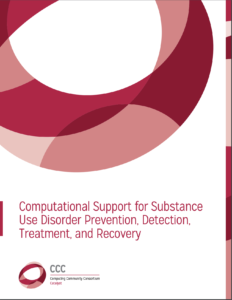 The Computing Community Consortium (CCC) is pleased to announce the release of the Computational Support for Substance Use Disorder Prevention, Detection, Treatment, and Recovery Workshop Report!
The Computing Community Consortium (CCC) is pleased to announce the release of the Computational Support for Substance Use Disorder Prevention, Detection, Treatment, and Recovery Workshop Report!
Chaired by Lana Yarosh from the University of Minnesota, the Computational Support for Substance Use Disorder Prevention, Detection, Treatment, and Recovery November 2019 workshop brought together an interdisciplinary group of leading researchers and practitioners to identify opportunities and challenges for enabling innovative computational support for prevention, detection, treatment, and long-term recovery from SUDs. The steering committee members were Suzanne Bakken (Columbia University), Alan Borning (University of Washington), Munmun De Choudhury (Georgia Institute of Technology), Cliff Lampe (University of Michigan), Elizabeth Mynatt (Georgia Tech), Stephen Schueller (University of California Irvine), and Tiffany Veinot (University of Michigan).
As outcomes from this visioning process, three broad opportunity areas for computational support in the SUD context were identified (see section 3 from the report for more details):
- Detecting and mitigating risk of SUD relapse,
- Establishing and empowering social support networks, and
- Collecting and sharing data meaningfully across ecologies of formal and informal care.
The workshop also identified cross-cutting challenges that affect how SUD computational support research is planned, carried out, and disseminated:
- Ethical considerations for working with stigmatized and vulnerable populations,
- Identifying and managing privacy risks and concerns data collection,
- Identifying and reducing potential harm when deploying computational SUD interventions,
- Enhancing theoretical underpinnings of interventions and how they may fit into broader theories of change,
- Recognizing and responding to the disproportionate burden of SUD in specific disparity populations, and
- Implementing, transfering, and sustaining interventions to create a path for innovative technical work to influence practice.
To learn more about the research recommendations that emerged at the workshop, read the full report here.









